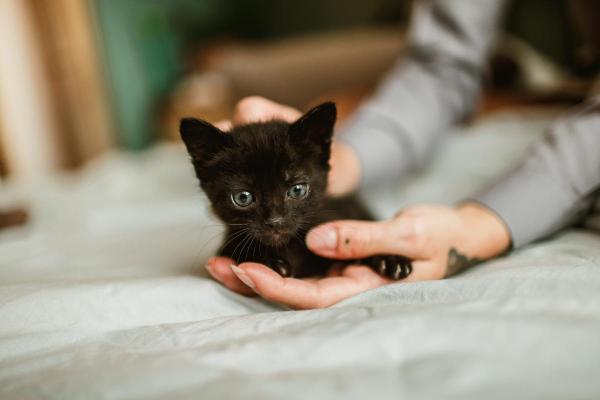Can I Touch My Cat’s Newborn Kittens?



See files for Cats
Welcoming a litter of newborn kittens is an unforgettable experience for any cat lover. Their tiny paws and playful personalities make it hard to resist scooping them up for a cuddle. However, before you indulge that urge, it's important to understand the best practices for ensuring their health and safety.
This AnimalWised post, we will explain when it is ok to touch your cat's newborn kittens and guide you through the delicate balance of respecting the mother-kitten bond while ensuring their well-being.
Can I touch my cat's newborn kittens?
The best situation for newborn kittens is to stay with their mother and siblings until they are 8 weeks old. During this time, they learn important skills like eating solid food and socializing with other cats.
Starting from the second month, it's good for them to get used to being around people who will take care of them.
Experts recommend not touching kittens until they are 10-14 days old to avoid health risks. They are very fragile, and their mother will take care of everything they need.
Handling kittens too early can be risky. Their immune systems are not strong yet, so they can easily get sick from bacteria and germs. They are also sensitive to cold, which can make them weak or even cause them to die if they get too cold and aren't warmed up quickly. It is crucial to wash your hands to prevent transferring any germs or bacteria to the kittens.
Another risk is that handling them too much might change their smell, which can confuse their mother. She might reject them because they don't smell right, which means she won't take care of them like she should. Also, if the mother cat seems stressed or aggressive when you approach, leave them alone. A stressed mother might accidentally injure the kittens. Kittens can also get scared or upset if they are handled too roughly, especially by children.
If the kittens seem cold, lethargic, or have trouble feeding, consult a vet immediately.
Ready to go beyond the basics of newborn kitten care? We delve deeper into the specific needs of abandoned kittens in this follow-up article
Should I keep the father cat away from newborn kittens?
In most cases, it's best to err on the side of caution and keep the father cat away from newborn kittens for a while. Unlike some other species where fathers play an active role in raising young, male cats generally don't exhibit paternal behavior. In fact, some intact male cats might see the kittens as competition and could injure or even kill them, particularly very young kittens.
The mother cat's priority is the health and safety of her kittens. Introducing another cat, even the father, can be stressful for her. A stressed mother might become less attentive to the kittens or even displace them, putting their health at risk.
If the father cat is neutered early in life and has a very docile temperament, supervised introductions after a few weeks (once the kittens are a little more mobile and the mother is comfortable) might be possible. But proceed with extreme caution and watch for any signs of aggression.
Remember, the most important factor is the safety and well-being of the kittens and their mother.
Thinking about transitioning your kittens from milk? Our comprehensive guide on kitten feeding breaks down the weaning process step-by-step, ensuring a smooth and healthy journey.

How do kittens like to be touched?
Thoroughly wash your hands before touching the kittens. This minimizes transferring any unfamiliar smells that might upset the mother.
Kittens, like adult cats, have preferences when it comes to being touched. Generally preferred areas are the back and the head. Gentle strokes along the spine are a good bet, and so are scratches behind the ears and under the chin are often well-received.
It is best to avoid certain areas such as the belly, paws, tails, and whiskers. These are vulnerable spots for most cats and can be ticklish or even aggressive.
It is crucial to pay attention to your kitten's signals. If they are purring and rubbing against you, these are signs that your kitten is enjoying the petting. However, if they display flattened ears, swatting, or hissing, it means they are overstimulated or annoyed. In such cases, stop petting immediately to give your kitten some space.
Let the kitten initiate contact and keep petting sessions short. If they seem to have had enough, let them walk away.
While a mother cat's natural instinct is to care for her kittens, new scents can be startling. Approach calmly and crouch down to her level. This reduces your size and seems less intimidating, especially for nervous cats. Offer your hand, palm down, a few inches away. Allow her to sniff it at her own pace. Maintain eye contact, but avoid staring directly, which can be seen as aggressive.
When returning the kittens, gently pet the mother again to reassure her. Place them close to her belly, allowing her to initiate nursing if she's comfortable. If she hisses, swats, or seems uncomfortable, back away slowly. Never force interaction.
Ever wonder if those adorable kittens actually need baths? We answer this common question and many more in our in-depth guide.
If you want to read similar articles to Can I Touch My Cat’s Newborn Kittens?, we recommend you visit our Facts about the animal kingdom category.






